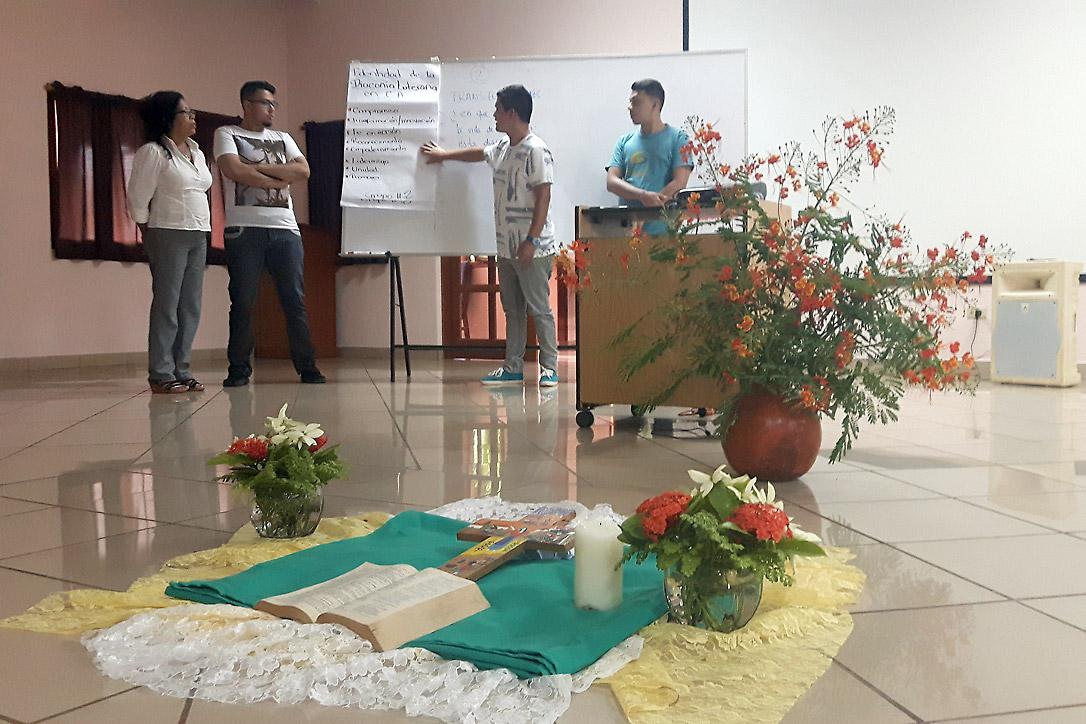Churches share best practice in fight against injustice

Participants discuss diaconal strategies during the workshop in Managua, Nicaragua. Photo: Grosvyn Ariel Rodriguez
Workshop for diaconal workers in Latin American churches
(LWI) - A three-day gathering of Lutheran church leaders and diaconal workers from Latin America and the Caribbean (LAC) confirmed the need for ongoing sharing of strategies and best practice to help churches develop organizational performance that sustains their work.
That was the assessment of Gustavo Driau, regional resource person, who facilitated a diakonia and human resource management workshop with representatives of The Lutheran World Federation (LWF) member churches in Costa Rica, El Salvador, Guatemala, Honduras and Nicaragua.
“Central American churches have been characterized by committed, comprehensive and consistent diaconal ministry for decades.” They have accompanied vulnerable people in the fight against injustice, indignity and suffering resulting from institutionalized poverty and oppression.
Churches are aware they need to ensure their leaders and diaconal workers are qualified in order to help sustain their outreach amid exploitative situations faced by people and the environment, particularly women victims of patriarchal violence, Driau added.
The Nicaraguan Lutheran Church of Faith and Hope hosted the 16-18 August workshop in Managua. The 25 diaconal workers attending shared best practice and challenges in carrying out church social service work in their respective countries. Driau facilitated sessions on how to strengthen and sustain ongoing work by focusing on the role of leadership and systematizing processes of planning, monitoring, evaluation and reporting.
“Diakonia is not only geared toward members of the church but to also communities in need,” Driau noted. “At the workshop, each of the churches illustrated the gifts of their diaconal work. We are proud to mention that each of the churches conducts admirable social work, with difficulties, but, in the end, with positive results.”
At the workshop, each of the churches illustrated the gifts of their diaconal work. We are proud to mention that each of the churches conducts admirable social work, with difficulties, but, in the end, with positive results.
Feeding children, supporting people living with HIV
Katia Cortez, representing the Nicaraguan church, noted that the exchange of experiences among the church workers was a critical contribution in such workshops. “Diaconal work must remain rooted in the Word of God,” she said, mentioning how her church’s support of families and communities affected by HIV illustrates acceptance of all people through Christ.
Gloria Rodriquez, representing the Christian Lutheran Church of Honduras said although it was “difficult and a lot of hard work is required” to run a program that feeds children and operates kindergartens in two different communities, it was worthwhile to maintain such services.
Jose Pilar Alvarez of the Guatemala Lutheran Church talked about his church’s work with indigenous communities, while Jensy Ana Rivera of the Lutheran Costa Rican Church talked about managing social welfare centers in a loving way.
The workshops are part of LWF’s Human and Institutional Capacity Development (HICD) program. In LAC the sessions are integrated in the regional sustainability program, with the aim of building up strategies and practices that ensure continuation and effectiveness of the different ministries carried out by churches, said Abebe Yohannes Saketa, LWF program coordinator at the Department for Mission and Development.
“The workshops are practical, because each participant can share their best practice and challenges about how human resources are managed. The mutual exchange also helps to identify skills and further training required to improve the services that churches provide to communities,” he noted.
Saketa said nearly 120 diaconal workers in Bolivia, Guyana, Honduras and Peru had taken part in HICD workshops between 2013 and 2015. Similar workshops will be held in Africa and Asia later this year.
LAC youth representative Grosvyn Ariel Rodriguez contributed to this story.




